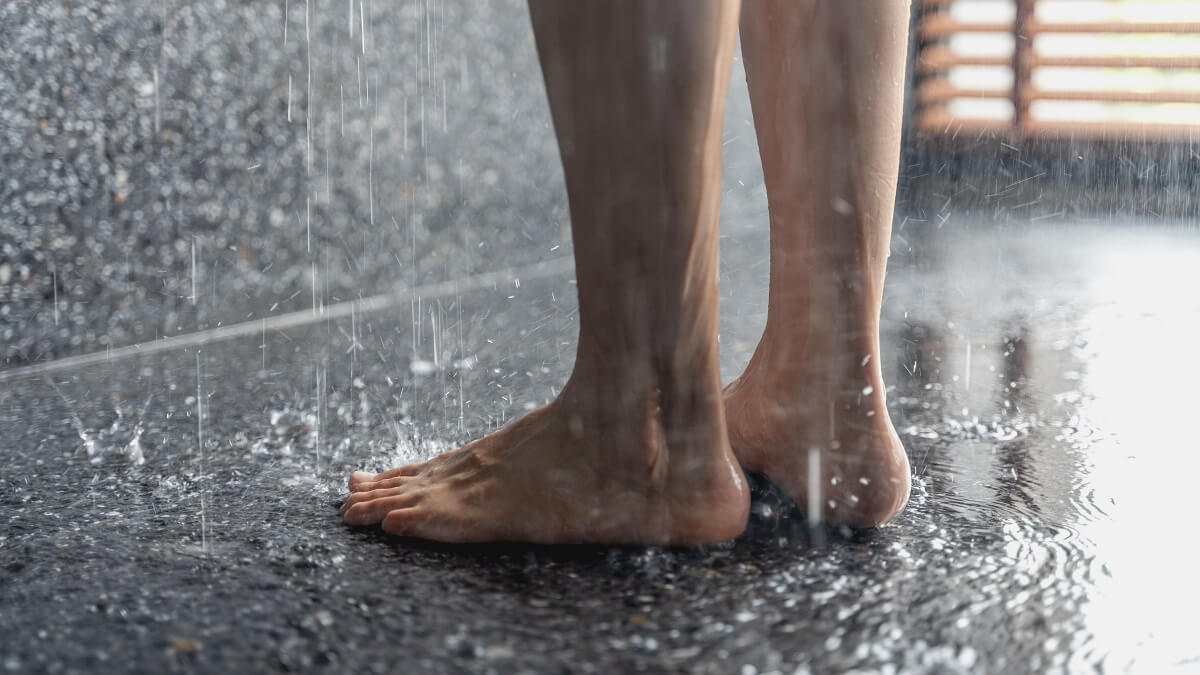Have you ever had a conversation about showering habits? In particular, about whether it’s okay to pee in the shower?
You might think you’re saving water or you might not have realised you needed to go until you stood under the shower. Well, a urogynaecologist is warning men and women to stop that habit – if it is a habit.
Is it okay to pee in the shower?
Dr Teresa Irwin explains in a video on TikTok that, while peeing in the shower occasionally is “totally fine” she advises against it if it has become a habit.
Essentially, she says that while the bladder empties correctly while standing up, peeing in the shower trains your brain to believe you need to relieve yourself every time you hear water running.
“You don’t want to do it all the time because what happens is every time you hear the sound of water, your bladder is going to want to pee – because it’s used to hearing the sound of the water in the shower,” she says in the video.
“So whenever you’re washing your hands, washing the dishes, your bladder is going to be salivating, so to speak, because it wants to go and pee.”
Doctors warn why you shouldn’t urinate in the shower
Dr Irwin’s view is supported by other health professionals.
Dr Alicia Jeffrey-Thomas, a pelvic floor therapist, also warns of the unwanted side-effects that can occur if you regularly pee under the shower.
“If you pee while the water is running, then you’re creating an association in your brain between the sound of running water and having to pee,” she says.
She explains that if you don’t have a strong pelvic floor, that can lead to “leak issues” whenever you hear water running.
However, Dr Jeffrey-Thomas disagrees with Dr Irwin when it comes to the optimal peeing method for emptying the bladder. She says females were not created “to pee standing up” and that the “pelvic floor isn’t going to relax properly, which means we’re really not going to be emptying our bladder super well”.
The solution? Urinate before you turn on the shower and, if you’re already in the shower, try to ignore the urge.
Professor Ajay Rane has described the perfect pee posture for women: feet flat on the ground to “promote relaxation of your thigh muscles and your pelvic muscles”, elbows on the knees so you “lean forward as if you are reading a newspaper on the floor” which helps to empty both your bowel and bladder.
The National Institute on Aging offers the following tips.
1. Use the bathroom often and when needed. Try to urinate at least once every three to four hours. Holding urine in your bladder for too long can weaken your bladder muscles and make infection more likely.
2. Be in a relaxed position while urinating. For women, hovering over the toilet seat may make it hard to relax, so it’s best to sit on the toilet seat.
3. Take time to fully empty the bladder. If urine stays in the bladder too long, it can make a bladder infection more likely.
4. Wipe from front to back. This keeps gut bacteria from getting into the urethra.
5. Urinate after sex. Sexual activity can move bacteria from the bowel or vaginal area to the urethral opening. Both women and men should urinate shortly after sex to lower the risk of infection.
6. Do pelvic floor exercises. Enough said?
7. Wear cotton underwear. Nylon underwear and tight-fitting pants can trap moisture and help bacteria grow.
8. Exercise regularly. Physical activity can help prevent bladder problems as well as constipation.
9. Keep a healthy weight. If you’re overweight, you’re at a greater risk of leaking urine.
10. Watch what you eat. Some people with bladder problems find that some foods and drinks, such as sodas, artificial sweeteners, spicy foods, citrus fruits and juices, and tomato-based foods, make bladder problems worse.
11. Drink enough fluids, especially water. More than half of the human body is made up of water, so it’s important that you drink enough.
12. Limit alcohol and caffeine. Caffeinated drinks and alcohol can bother the bladder and increase the need to urinate urgently.
13. Avoid constipation. Too much stool in the colon can put pressure on the bladder and keep it from expanding the way it should.
14. Quit smoking.
15. Know your medications. Some medications may make it more likely for your bladder to leak. Check with your health professional if you believe that is a problem.
Did you know that it’s bad to urinate in the shower? Share your thoughts in the comments section below.
Also read: Faeces, urine and sweat – just how gross are hot tubs?


God help those that live by a water fall or the sea!
So now we can identify who Pee’s know the shower. Ha ha
For all the times you pee in a day, once in the shower is not going to do any damage, ridiculous article
Gave me a good laugh!